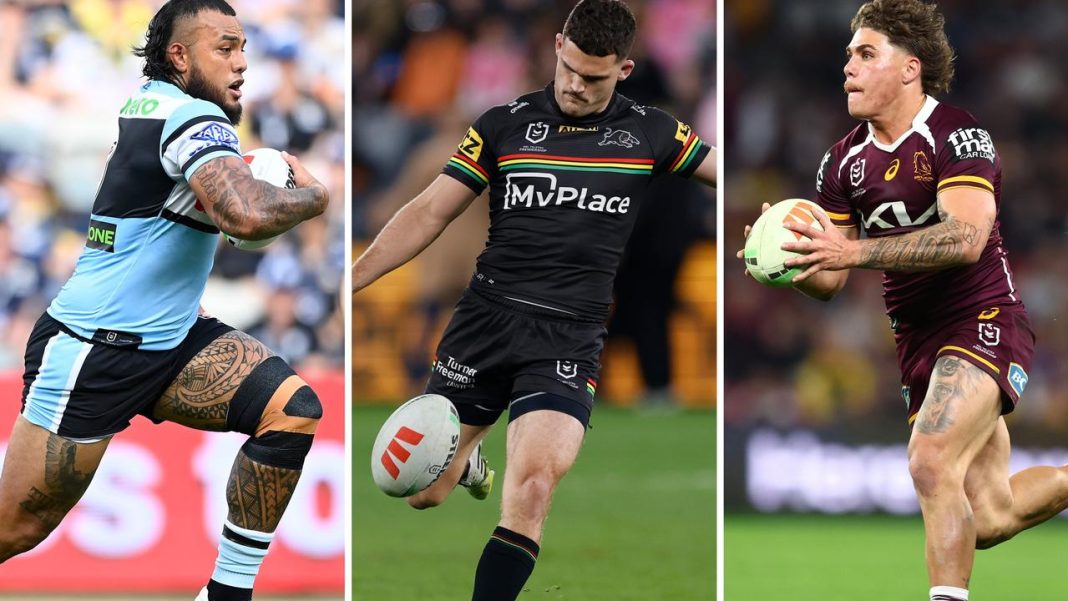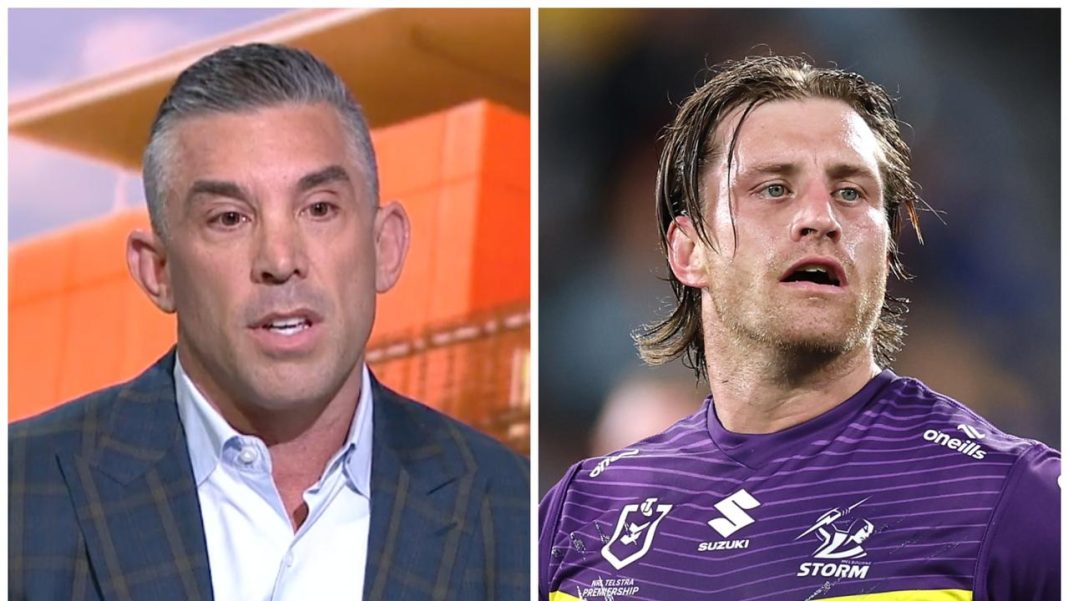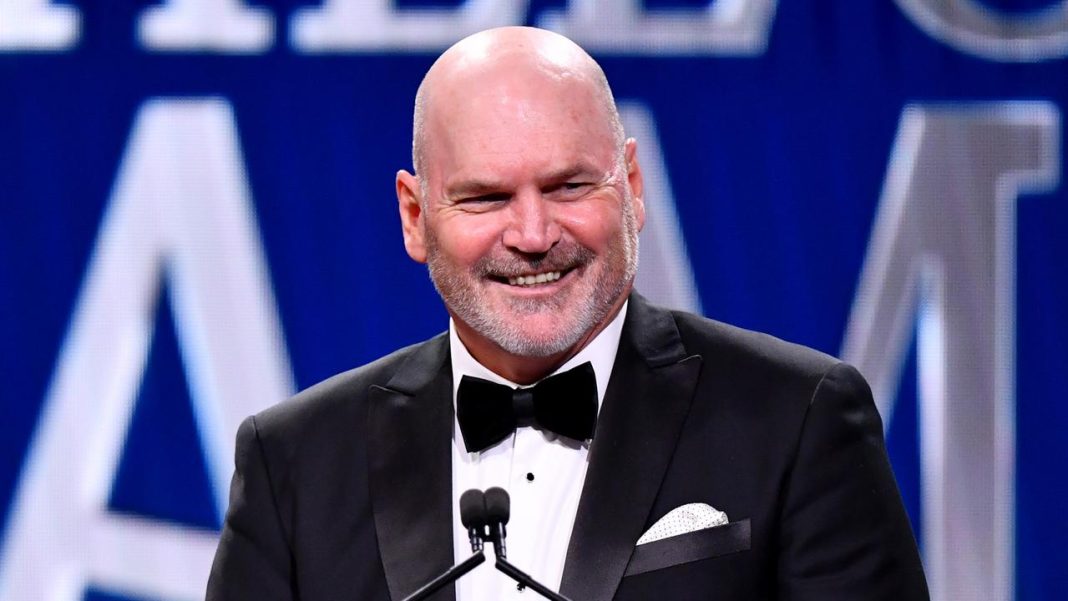Rugby league is the greatest game of all — but I think we can make it better.
FOX LEAGUE, available on Kayo Sports, is the only place to watch every game of every round in the 2025 NRL Telstra Premiership, LIVE with no ad-breaks during play. New to Kayo? Get your first month for just $1. Limited-time offer >
State of Origin is the pinnacle of our sport. However, this year’s clashes lacked the spice or highlight-reel moments fans have become accustomed to.
That’s no one’s fault, just coaches and players becoming more adept at delivering tactics that go hand-in-hand with the current rules being imposed with the NRL.
But what if we were to change them?
Last year, I ran into Allan Bell at Newcastle’s old boys day. If you don’t know who Bell is, he is rated as one of rugby league’s most astute minds.
He was the architect behind the Knights when they started and worked closely with both Andrew and Matty Johns. They can’t speak highly enough of Bell.
He was the man I knew could provide insight into changes we could make to help the NRL flourish, and I also touched base with other prominent coaches and players.
Now, I don’t know the exact solutions, all I can do is spark a conversation.
But here’s the suggestions we’ve come up with to make rugby league the exciting game we love again.
MORE NRL NEWS
CRAWLS: $1m move Souths would be mad not to make; Gus treating fans like mugs
WHISPERS: Shock $900k rebel swoop for Souths gun; Dragons lock in exiled star
‘ONE OF GREATEST BLUNDERS’: Who’s to blame for $2m, 68-minute Souths shocker
WHY DO CHANGES NEED TO BE MADE?
The core principles of the NRL need to be reinstated to make the game the entertaining showcase we know it can be.
So what are the key points that should be focused on to make a better product?
– The NRL must return to a game where all body types and unique skills have value in specific positions.
– The running game must be emphasised to once again become the primary focus.
– The game’s overall reliance on kicking must be reduced by rewarding attacking plays that are based around running the ball.
WHAT ARE THE NRL’S BIGGEST PROBLEMS?
While rugby league still is able to produce some awe-inspiring moments, I believe each and every game can be thrilling.
The dominant teams in the NRL are able to pile on pressure and drive their opponents into the ground, meaning sometimes fans are treated to a one-sided affair.
This is because of a multitude of reasons:
– The successful structures adopted by teams are robotic and predictable, which are rewarded by the current rule-set.
– Teams rely way too much on hit-ups to keep their attack structured, but in turn their creativity is dampened and attacking plays become minimised.
– Tactics are too heavily reliant on kicking games.
– Refereeing and contentious decisions have become more and more prevalent and the enforcement of play-the-ball and offside rulings have been inconsistent.
Dodd free to leave | 00:20
Fans want creativity, flair and excitement, and we can highlight that by addressing these key issues.
Another factor that comes with the grinding nature of the modern game is the high injury toll.
Yes, players take the field now more than ever before, but the injury toll on certain clubs has been unimaginable.
Our star players are missing too many games, the quality of our contests is becoming diluted due to those elite players being sidelined and there’s concerns surrounding the long-term threats of CTE and other long-lasting injury concerns.
The existing safety measures are insufficient, but that’s a conversation for another day, and the threat of future legal claims could genuinely damage the NRL.
SO HOW DO WE FIX IT?
Here are my proposed solutions, and it begins with adjustments to rugby league game play:
– Reduce interchanges to only six per game to increase game continuity.
– Penalties must be taken on the spot — no kicking or choice of location.
– No more scrums and instead a handover takes place.
– No six-agains inside your own half, with penalties awarded instead.
– Sin bins for third repeat deliberate penalties that occur within the same set.
That would mean more spontaneous football, more one-on-one tackles and more fatigue, and in turn less gang tackling.
This change would also increase the role of smaller, creative players who have become somewhat obsolete in the modern game.
I also believe the influence of kicking on a contest needs to be dampened.
As it stands, if you win the kicking battle, you win the game.
Look at the Panthers success. It’s no surprise they have Nathan Cleary, arguably the most skilled kicker in the game leading them around the field.
With kicking having such a big influence on contests, the importance of running the ball and breaking a line is reduced.
‘Offended’: Legends hit back at Tigers | 03:22
The importance of kicking has also impacted the talent pool of playmakers.
Halfbacks need to be able to kick, whereas in the past their running game could be their best asset.
If you don’t have a massive boot, you can’t be an elite half.
In years gone by, when the game flowed more, the depth in the halves position was immense compared to how it sits in the modern game.
Think back to the 2000s, you had Craig Gower, Brett Kimmorley, Scott Prince, Benji Marshall, Jamie Soward, Brad Fittler, Andrew Johns, Matty Johns, Darren Lockyer.
That style of playmaker isn’t on brand anymore, specifically because of the importance of kicking.
So here are some changes I’d make:
– The kick-off after a try, the kicking team restarts and that kick must go 20 metres or a penalty is blown.
– Line drop outs must go 20 metres, or a penalty is blown.
– Scrap the 40/20 and other rewards for kicks, stemming the flow of possession.
– Tries scored off kicks are only worth three points.
– Sin bins for third repeat deliberate penalties that occur within the same set.
‘Greatest recruitment blunder ever?!’ | 03:01
Meanwhile, the way in which our game is refereed needs reassessed, by everyone, including fans. Our game’s officials are expected to be robots.
They can’t get everything right, that’s not reality. By slowing each decision down, we are slowing the game down. Too many stoppages occur because of refereeing decisions.
Therefore, I believe the following should be implemented:
– More ‘play on’ calls for 50/50 knock ons, play-the-balls and line forward passes.
– Reduce the influence of the Bunker and enforce rules consistently throughout a whole season.
– Crack down on deliberate rule breaking and teams who consistently flaunt the line, especially when it comes to the play-the-ball and early tackle offsides.
– More sin bins for repeat offenders.
– Stop the influence of captains in slowing down calls that could influence the result of a contest.
– Bunker decisions will be limited to one minute max, otherwise they follow the on-field ruling should a decision not be made.
Is Souths’ ‘top 8 side’ in spoon danger? | 01:15
In what could be a radical change, I also believe we should have only 12 players on the field, not 13.
There’s ongoing discussion in rugby union regarding whether they should drop from their traditional 15-man game, while I believe rugby league could benefit from a similar move.
The lock position is the obvious one to go, meaning there’s no influence on the left and right defensive lines, only opening up the middle of the park.
By dropping to 12 players on the field, the influences would be:
– A more open field for players to be creative, which in turn creates faster and more exciting game play.
– The robotic structures implemented by coaches would also be broken down.
– Less players on a team also means a smaller squad, which would spread talent out to the new expansion clubs set to join the NRL.
Was the NRL too soft on Penrith trainer? | 03:42
RESISTANCE TO CHANGE
There’s always going to be resistance to change, when change comes in the form of a some fairly radical rule overhauls.
After my discussions with experts in the game, I also am not saying these are the perfect and definitive ways to make rugby league a better game.
But the conversation surrounding it needs to start.
Clubs will likely resist such changes, especially those who are finding success in the current system.
There’s likely also going to be short-term concerns as teams, clubs and coaches get used to the new face of rugby league.
Cam Munster free to explore Perth switch | 02:22
But to fully make the NRL the most appealing product, the short-term benefits of it’s current trajectory and landscape need to be forgotten about, to prioritise the long term future of rugby league.
These changes could also serve to enhance the safety of women’s and junior rugby league competition, in turn boosting participation rates.
Lower injury rates mean great longevity for players, and more enjoyment of fans as they follow their favourite teams and stars.
Overall, I believe we these changes can polish what is, at its core, the best sport in the world.




